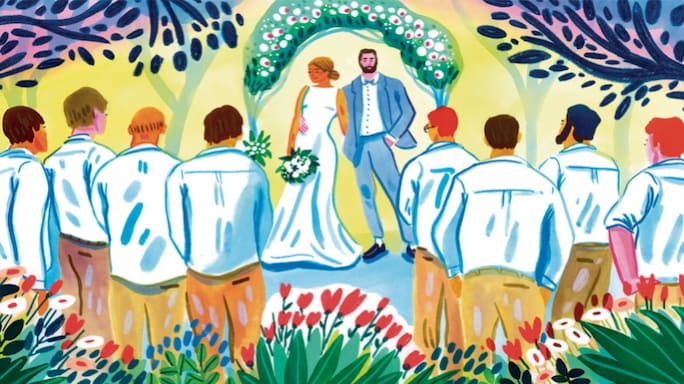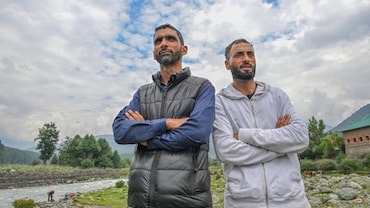Fathers of the Bride
A young woman finds a unique way to honour the many men who helped her survive her childhood
 illustrations by Maguelone du Fou
illustrations by Maguelone du Fou
In the summer of 2023, on a warm afternoon in Chelan, Washington, a beaming young woman named Ivy Jacobsen stood ready to walk down the aisle toward her husband-to-be.
Her blonde hair was in a loose bun, and her long white gown was simple and sleek, with just a hint of a ruffle at the back. Waiting for Ivy at the altar was the love of her life, Tristen Jurgensen, who was 28 years old like Ivy and a sheriff’s deputy, wearing a blue-grey suit and tearing up with emotion at the sight of his bride.
More than 300 guests had gathered for the wedding ceremony, held in a backyard venue framed by rocky mountains and tall pine trees. From the green grass under Ivy’s feet to the blue sky overhead dotted with wisps of white clouds, the day was picture perfect.
For Ivy, this happy moment was hard won. She’d endured an almost unimaginably difficult childhood, having been abused by her father from a young age. At times, she wondered if she would always live in fear. She worried about her mom and her little brother and sister. She worried about her future. But she survived, thanks, in no small part, to a large support group.
“There are a lot of people who have helped me get to where I am now,” she says. In particular, she credits some special men who were always there for her, who stepped in as role models, friends and surrogate family. “I wanted to find a way to honour them.”
So she asked the men—all 15 of them—to give her away at her wedding. They travelled from near and far, and they had met Ivy at various points in her life. But they have two important things in common: They love her dearly, and she considers most to be father figures.
Standing along both sides of the aisle at Ivy and Tristen’s ceremony were these men, all dressed in khaki pants and crisp white shirts. There was her funny high school English teacher and golf coach, who had let her eat lunch in his empty classroom when she needed time to herself. There were six former basketball coaches, spanning her career in the sport, from learning to dribble in fourth grade to playing guard on the high school varsity team. There were relatives: her younger brother, future brother-in-law and maternal uncle, as well as other uncles in name only—family friends whom she considers kin. And there were her mentors, including a police officer who helped inspire her to escape the horrors at home.

Every few steps she took toward the altar, a new pair of fatherly figures were on either side of her, taking her hands as she smiled at them tearfully.
When the officiant asked, “Who gives this woman to be married to this man?” a chorus of deep voices answered: “We do.” Ivy was in sixth grade when her father began molesting her while her mother was at work. He was also violent toward her mom and younger siblings.
“We were in a constant state of fear,” Ivy recalls. Some parts of her life seemed normal—she excelled at sports, and she had friends. But behind the scenes, Ivy’s father controlled everything. He blocked her access to the internet and cellphones, and he limited the people she was allowed to talk to. He even dictated what clothes she could wear, banning anything too ‘girly’ or tight. So she wore athletic wear. If she had to dress up for a school event, he would go shopping with her.
But most of all, he warned her never to trust anyone, especially in law enforcement. Scared and isolated, Ivy kept the abuse hidden from everyone; her father said that “bad things would happen to Dad” if she told.
Despite those warnings, Ivy managed to forge a meaningful connection with a police officer who worked at her middle school, Officer White* of the Marysville Police Department. Ivy met White, a school resource officer, when she worked in the main office as a student assistant. White’s office was next door, and they would often chat about sports, school, whatever. One holiday season, the two engaged in a competition to see who could hang the most decorations around school. It was a bit of fun in a childhood devoid of it.
All those interactions began to add up for Ivy. Here was an adult she could trust. But if Ivy’s father found out she was friends with a cop, she’d be punished. So she never let White in on her secret.
The abuse continued until 2011, when Ivy was a sophomore. Her best friend, realizing something was wrong, asked point-blank what was going on.
“I didn’t know how to respond. I was scared,” Ivy says. She was especially nervous because her friend’s dad was a police officer. What might happen if she told? But life at home was unbearable. She confided in her friend, who told her own parents.
The next day, a detective came to talk to Ivy at school. “This detective asked, ‘What’s happening? You need to tell us what’s happening.’ And at that point I’m thinking, I’ve been told never to trust the police,” she says.
But all she could think was, Am I going to keep living like this? Will I ever stop living in fear? “I knew that the detective was with Marysville Police, where Officer White worked. And I’d always felt very safe with Officer White,” she explains. With that connection in mind, she made the decision to reveal everything. “I didn’t know when my next opportunity would be.”
Soon after, Ivy’s father was arrested—by her friend, Officer White.
Life improved after that, but Ivy still had a long journey toward healing. And that’s when the men in her life stepped up. Money was tight in the wake of the arrest and her parents’ eventual divorce, but one of her uncles was there to pitch in. He showed up at her basketball games, paid participation fees for Ivy’s sporting events and bought her dresses for senior homecoming dance and prom. And when Ivy and her family didn’t feel safe in their home after her father was released on bail, the same uncle gave them a safe place to stay.
While still in high school, Ivy testified against her father in court. After that trial resulted in a hung jury, she faced him from the witness stand in a second trial, with the same result. After she testified in a third trial, in the summer of 2013, her abuser was finally convicted and sentenced to almost 16 years in prison. Throughout all three court cases, her coaches showed up in the courtroom, offering moral support. Having to recount the worst experiences of her life was excruciating, but looking out day after day and seeing a coach flash a reassuring smile or a quick nod made her feel less alone.
“They heard everything,” Ivy says of the men and their regular presence in court. “I don’t know how they did it, but their presence got me through.”
And then there was a network of ‘uncles’ who, after being kept away by Ivy’s abuser, all reached out to Ivy and her siblings following his arrest and reentered their lives. There was her father’s former best friend, now living in Arizona, and her mom’s first husband and his two brothers.
 Ivy and Tristen, after exchanging vows during their ‘different’ wedding. Photo: Courtesy Ivy Jurgensen and family
Ivy and Tristen, after exchanging vows during their ‘different’ wedding. Photo: Courtesy Ivy Jurgensen and family
“It might sound kind of messy, but it’s been amazing,” Ivy says. “Our adopted uncles like to take us snowboarding or grab a beer with us and hang out. It just feels natural. They’ve just never given up on us.”
After her abuser was convicted, Ivy began to feel free in a way she never had before: She got her driver’s licence and a cellphone, and relished just “being a normal kid,” as she puts it. She ditched the baggy boys jeans and T-shirts in favour of form-fitting jeans and colourful blouses. She wore makeup for the first time and played with various hairstyles. In short, she blossomed into a typical teenage girl.
Intent on helping other silent victims of abuse, she began sharing her story. The first time was as a speaker at her graduation from Lake Stevens High School in the spring of 2014 in front of a crowd of 6,000 people. School administrators had selected her to speak based on her academic and athletic achievements. But her speech quickly became personal.
“There was this girl,” she began. “She was manipulated at a young age. She could only wear certain things to school and could only talk to particular people. She was socially and culturally inept. Also, behind the scenes, her father had started to rape her when she was in the sixth grade. She did not know that what he was doing was wrong. Last summer, 15 July, her father was finally put into prison. Where is this girl now?”
Her voice, strong and steady up to this point, quickened as she revealed, “She is standing before all of you. I am that girl.”
When her speech ended, the audience members rose as one, clapping and cheering their classmate.
Encouraged by her reception, Ivy volunteered as a spokesperson for Dawson Place Child Advocacy Center, a nonprofit that had provided her with free counselling and legal services. They also supplied comfort during uncomfortable times at the courthouse. During breaks, she would find Dawson Place staff members with therapy dogs waiting for her in the hallway. She’d cuddle with the dogs, as if they were living, breathing, licking security blankets.
After high school, Ivy kept in touch with Officer White and began dreaming about a career in law enforcement for herself. While working as a personal trainer at a gym, she befriended a juvenile corrections officer named James, [Full name has not been used, for privacy] who encouraged her aspirations. “He said I would be a great first responder,” says Ivy. That, and Officer White’s prodding, “helped push me in that direction.” Soon, Ivy entered the police academy.
As a result of all this support, Ivy is living a life she could never have expected back in middle school. Today she works for the East Wenatchee Police Department as a school resource officer—just like Officer White, who is now retired. She spends her days at Eastmont High making sure school is safe and that the students always have an ear to bend.
“I hear about the breakups or the bullying,” she says. “Sometimes kiddos say, ‘I need to talk to you about something. Can you pull me out of class, but make it for something else so that kids don’t know that I’m coming to talk to you?’ It’s all about relationship building, so that they know that we’re always there.” The same way that Officer White and so many others were there for her.
Because her offender was released from prison early, Ivy does not want to identify most of her wedding escorts by name, for their privacy and safety. But on Ivy and Tristen’s big day, Officer White and James stood proudly among the 15 men lining the aisle ready to give her away, as a soft love song, ‘You Are the Reason’ by Calum Scott, played. A look at the lyrics may give a clue why she chose that song:
“If I could turn back the clock I’d make sure the light defeated the dark I’d spend every hour of every day / Keeping you safe.”
Through the love and support of these men, as well as watching many of them raise their own daughters over the years, Ivy has gotten a taste of what having a caring dad looks like. Of what ‘safe’ looks like. “It’s been like relearning what’s normal, since my upbringing was not normal,” she says.
Ivy knows her walk down the aisle was unique, and that was by design. “I’m OK with having our wedding be different,” she says. “I wanted to show Tristen that this is how much support I’ve had, and this is how much support we’ll continue to have together.”






